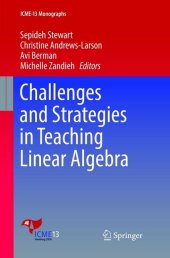 Neuerscheinungen 2019Stand: 2020-02-01 |
Schnellsuche
ISBN/Stichwort/Autor
|
Herderstra▀e 10
10625 Berlin
Tel.: 030 315 714 16
Fax 030 315 714 14
info@buchspektrum.de |

Christine Andrews-Larson, Avi Berman, Sepideh Stewart, Michelle Zandieh
(Beteiligte)
Challenges and Strategies in Teaching Linear Algebra
Herausgegeben von Stewart, Sepideh; Andrews-Larson, Christine; Berman, Avi; Zandieh, Michelle
Softcover reprint of the original 1st ed. 2018. 2019. xiii, 382 S. 89 SW-Abb. 235 mm
Verlag/Jahr: SPRINGER, BERLIN; SPRINGER INTERNATIONAL PUBLISHING 2019
ISBN: 3-319-88322-4 (3319883224)
Neue ISBN: 978-3-319-88322-9 (9783319883229)
Preis und Lieferzeit: Bitte klicken
This book originated from a Discussion Group ( Teaching Linear Algebra ) that was held at the 13th International Conference on Mathematics Education (ICME-13). The aim was to consider and highlight current efforts regarding research and instruction on teaching and learning linear algebra from around the world, and to spark new collaborations. As the outcome of the two-day discussion at ICME-13, this book focuses on the pedagogy of linear algebra with a particular emphasis on tasks that are productive for learning.
The main themes addressed include: theoretical perspectives on the teaching and learning of linear algebra; empirical analyses related to learning particular content in linear algebra; the use of technology and dynamic geometry software; and pedagogical discussions of challenging linear algebra tasks.
Drawing on the expertise of mathematics education researchers and research mathematicians with experience in teaching linear algebra, this book gathers work from nine countries: Austria, Germany, Israel, Ireland, Mexico, Slovenia, Turkey, the USA and Zimbabwe.
Part I. Theoretical Perspectives Elaborated through Tasks
The Learning and Teaching of Linear Algebra through the Lenses of Intellectual
Need and Epistemological Justification and Their Constituents
Guershon Harel
Learning Linear Algebra Using Models and Conceptual Activities
MarÝa Trigueros
Moving between the embodied, symbolic and formal worlds of mathematical thinking with specific linear algebra tasks
Sepideh Stewart
Part II. Analyses of Learners┤ Approaches and Resources
Systems of linear equations - a key element in the learning of Linear Algebra
Asuman Oktac
Rationale for Matrix Multiplication in Linear Algebra Textbooks
John Paul Cook and Dov Zazkis
An Action Process Object Schema (APOS) analysis of the understanding of determinants of matrices by Zimbabwean undergraduate mathematics students
Catherine Kazunga & Sarah Bansilal
Difficulties associated with understanding the concept of vector subspace: A case
study of Zimbabwean teachers
Lillias H.N. Mutambara and Sarah Bansilal
Stretch Directions and Stretch Factors: A Sequence Intended to Support Guided Reinvention of Eigenvector and Eigenvalue Stretch Directions and Stretch Factors: A Sequence Intended to Support Guided Reinvention of Eigenvector and Eigenvalue
David Plaxco, Michelle Zandieh, and Megan Wawro
Examining Students┤ Procedural and Conceptual Understanding of Eigenvectors
and Eigenvalues in the Context of Inquiry-Oriented Instruction
Khalid Bouhjar, Christine Andrews-Larson, Muhammad Haider, & Michelle Zandieh
Part III. Dynamic Geometry Approaches
Mental Schemes of Linear Algebra Visual Constructs
Hamide Dogan
How DGS mediates students┤ reasoning on 3D linear transformations: a combined
analysis from thinking modes and semiotic perspectives
Melih Turgut
Fostering Students┤ Competences in Linear Algebra with digital Resources
Ana Donevska-Todorova
Part IV. Challenging tasks with pedagogy in mind
Linear Algebra-a Companion of Advancement in Mathematical Comprehension
Damjan Kobal
An algebraic/computational approach to systems of linear equations in a Linear
Algebra Course for students of computer science, physics, and mathematics
Franz Pauer
Nonnegative Factorisation of a Data Matrix as a Motivational Example for Basic Linear Algebra
Barak A. Pearlmutter & Helena Smigoc
Motivating Examples, Meaning and Context in Teaching Linear Algebra
David Strong
Holistic Teaching and Learning Holistically, exemplified through one example
from Linear Algebra
Frank Uhlig
Using Challenging problems in Teaching Linear Algebra
Abraham Berman


